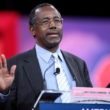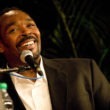Après le Déluge
“Never again will I curse the ground because of man, even though every inclination of his heart is evil from childhood.”—Congressman John Shimkus quoting
God at a 2009 Congressional hearing
The criminal charges former House Majority Leader Tom DeLay faces in an Austin courtroom are straightforward.
Since 1905, it has been a crime for a corporation or a union to contribute to a candidate running for elected office in Texas. In the 2002 election cycle, a Texas political action committee that DeLay and his political operative Jim Ellis had set up — Texans for a Republican Majority Political Action Committee, or TRMPAC — raised more corporate money than they could legally spend.
To get the corporate dollars into the campaign accounts of individual candidates the PAC supported, TRMPAC’s state director, John Colyandro, sent $190,000 in corporate funds to a Republican Party campaign committee in Washington.
Two weeks later, exactly $190,000 dollars was sent back to seven specific Republican candidates for the Texas House of Representatives. DeLay’s defense attorney, Dick DeGuerin, claims that the money sent to Washington was not the same money returned to Texas, because the check sent to Washington was deposited in a soft-money bank account, and the checks sent to the seven candidates in Texas were drawn on a separate hard-money account. (Corporate contributions are known as “soft” money; individual contributions are “hard” money.)
The judge is not convinced.
“I hear every word you’re saying and I think it’s irrelevant,” Judge Pat Priest told DeGuerin. “If you send it up there and they put it in one pocket and take it out of another, you’ve committed a crime.”
Nor does the judge seem inclined to accept the defense’s overarching argument: that DeLay is being prosecuted for nothing more than the capital-intensive electoral politics practiced all over the country.
The senior judge from San Antonio reiterated that Texas law prohibits corporate contributions to individual candidates. “I don’t care who is doing what,” Priest said. “If the Pope and the Dalai Lama were doing this, that don’t make it okay.”
The judge made both comments while the jury was out of the courtroom. But he is unequivocal about the $190,000 money transfer. (He also told the defense attorneys: “Money is fungible. It’s like beans.”) What remains is for the prosecution to prove criminal intent.
If convicted, DeLay faces a maximum sentence of life in prison. That someone could be put away for life for what DeLay is alleged to have done is a reminder of the harsh irrationality of criminal jurisprudence in Texas.
DeLay is now openly discussing reforms he will be promoting in the Texas Legislature, though sentencing reform isn’t on his list. Once he is exonerated, he said, he will turn his attention to decriminalizing the money-in-politics restrictions that Travis County District Attorney Ronnie Earle (now retired) used as the basis for his indictment.
POLITICS ON TRIAL—Jury trials — in particular jury trials that continue for weeks — are often built on trope. For the first three weeks of the trial, Houston defense attorney Dick DeGuerin worked several tropes that are essential to his defense:
“Money is the lifeblood of politics.”
“The races are expensive, aren’t they?”
Both “Republicans and Democrats” need to raise huge amounts of money to compete.
Texas election law notwithstanding, the subtext of DeGuerin’s argument can’t be ignored. What is on trial in an Austin courtroom is electoral politics as they are practiced across the country today.
“I believe there should be more money in politics, not less,” DeLay told reporters at a pre-trial hearing. In 2002, DeLay was onto a new political paradigm before most of the country had it figured out. What happened in Texas on November 5, 2002, is what happened to the country on November 2, 2010.
Consider. In 2002, a Democratic majority in the Texas House of Representatives was the only impediment to Republican political hegemony. Republicans controlled all the statewide elected offices, the Texas Supreme Court, and the state Senate. Winning control of the House was an obvious objective.
DeLay, and two of his political operatives scheduled to go on trial for lesser charges, created the Texans for a Republican Majority Political Action Committee, which invested $1.55 million in state House races to ensure that Republicans took control of the House and selected a speaker.
Much of the money that TRMPAC raised came from corporate donors who gave generously to TRMPAC (and to DeLay’s federal PAC, Americans for a Republican Majority) because it bore the imprimatur of the majority leader of the House of Representatives.
And much of the money came from the right-wing millionaires who dominate the political landscape in Texas: oil-and-gas magnate T. Boone Pickens, Houston Astros owner Drayton McLane Jr., Dallas oil-and-gas millionaire Louis Beecherl Jr., Monsanto multi-millionaire J. Virgil Waggoner, Houston homebuilder and Swift Boat Veterans for Truth underwriter Bob Perry, et al. The same A-List to which Karl Rove turned in 1999 when he began the “money primary” that made George W. Bush president.
TRMPAC didn’t work alone. As reported in detail in The Texas Observer in 2003, the Texas Association of Business (TAB) raised $1.9 million, much of it in corporate money, to target 22 state House races and two state Senate races.
The similarity of TAB and TRMPAC election mailers caught the attention of Fred Lewis, an Austin lawyer who had left the state attorney general’s office and has since set up several good-government advocacy groups. Two near-identical TRMPAC and TAB mailers that arrived in Lewis’s mailbox, he told the jury at DeLay’s trial, “made me think the two entities were cooperating.”
Lewis, who would file a complaint with the Travis County DA, was spot on. The “two entities” even relied on the same lawyer, which the first week of testimony revealed. Austin lawyer Ed Shack provided legal advice for TRMPAC in 2002. And as The Texas Observer reported, Shack advised potential TAB donors “that federal courts had ruled that independent organizations like the TAB could legally produce ‘issue ads’ with corporate money so long as the mailers were designed simply to educate voters — not advocate for the election or defeat of a candidate.”
It was issue ads “educating” voters, and unprecedented sums of money from corporate sources, that defined this year’s mid-term elections.
Substitute “U.S. Chamber of Commerce” for the Texas Association of Business, and “American Crossroads” and “Crossroads GPS” for “TRMPAC,” and you have the playbook by which Republicans won a landslide in 2010 — a playbook to which they will return with exponentially more corporate funding (most of it undisclosed) in 2012.
Even the players are the same, with G.W. Bush advisor Karl Rove going to the same right-wing rich Texans for the tens of millions he needed to start American Crossroads and Crossroads GPS, which spent almost $100 million on issue ads attacking Democratic candidates in this year’s elections. There was even more political incest; TRMPAC’s state director worked for Rove before he worked for TRMPAC.
SCHOOL FOR SCANDAL—I spent much of 2002 and 2003 following Tom DeLay in Washington for a book I wrote with Texas Monthly writer Jan Reid. Reporters, however, lack subpoena power and the authority to swear in witnesses. Three weeks of testimony at DeLay’s trial in Austin confirmed, and in some instances, added to, our reporting on the buying and selling of government that was common when DeLay was the majority leader.
Consider a few examples described in the testimony.
In May 2002, Warren Robold, an evangelical minister who found a lucrative second career in political fundraising, arrived in Austin to make a cold call on Jack Dillard, the director of Phillip Morris’s lobbying in the Southwest.
The two men met over drinks at an exclusive club two blocks south of the Capitol. “He told me he had raised money in Washington for ARMPAC [DeLay’s federal PAC]” Dillard said. “He solicited our company for TRMPAC. He suggested that we might want to make a contribution of $100,000.” Dillard was offered the opportunity to meet with DeLay in Texas the following week.
In November 2001, El Paso (Energy) Corp. vice president for government affairs Lori Ziebart wrote an e-mail to her boss in which she described the company’s relationship with DeLay’s federal PAC. “Tom has set up a similar PAC in Texas,” she wrote. “We were hit up for this effort as well.”
The e-mail, which prosecutors requested that she read to the jury, revealed that Ziebart suggested the company “kill two birds with one stone, $50,000 to ARMPAC and $50,000 to TRMPAC.” The $100,000 was her ticket to a Friday night reception and dinner with DeLay at a Virginia resort in June 2002, followed by a round of golf on Saturday.
The pay-to-play golfing event was organized by Drew Maloney, who had resigned as DeLay’s chief of staff to work as an energy lobbyist. A small group of energy company executives — no lobbyists invited — attended.
The prosecution focused on the $25,000 to $100,000 the executives were required to pay to meet with DeLay while an energy bill was being negotiated in conference committee. In particular, prosecutors focused on one small Midwestern company that had talked its way into an event planned for bigger players like Duke, Reliant, and El Paso Corporation.
There was no suggestion of a quid pro quo with the big energy companies. But Glenn Jackson, an executive with Kansas utility Westar, explained his company’s $25,000 contribution.
“It’s difficult to set up an opportunity to sit down with the leader of the majority …” Jackson said. “Every utility in the country wanted to repeal the Public Utility Holding Company Act. But repealing PUCHA took away a mechanism in the law that would allow us to do the restructuring we wanted to do. … What we needed, we called it the grandfather clause, was a special provision.”
In an August 2002 interview with the DA and the DA’s staff in Austin, just two weeks before he was indicted, DeLay said he wasn’t in a position deliver what Westar wanted. He admitted that he had been contacted by Drew Maloney on behalf of Westar. And that he was very much involved in moving the bill through Congress. But he took no action, he said, on behalf of the company.
“Actually Joe …” DeLay said, referring to the chair of the energy subcommittee that drafted the Westar provision. “Joe Barton is the one who carried the water for them.”
A HUNDRED MORE DELAYS?—”Put this guy away and the Republicans have a hundred more in Congress ready to do the same thing,” a private lawyer who worked on the Texas Association of Business case said as we walked from the courthouse in Austin.
In the Congress that we elected in November, one of that 100 is already evident in a three-way fight for a committee chairmanship.
Joe Barton, from Ennis, Texas, has served a combined six years as chairman and ranking member of the House Energy and Commerce Committee and is termed out by Republican House rules. His only route to the chairmanship requires a waiver by the House leadership. Barton, who embarrassed the party with his public apology to BP CEO Tony Hayward after President Obama forced the company to set aside $20 billion for oil-spill reparations, wouldn’t be in the running had he not collected $1.67 million from oil-and-gas interests since 1990.
Barton not only practices the carry-the-water and collect-the-money politics that Tom DeLay perfected. In his campaign to recapture the Energy and Commerce chair, Barton has turned to the same crude, intramural tactics for which DeLay once earned the fear of his fellow Republicans and the nickname, “The Hammer.”
Barton’s staff, according to an e-mail from a Democratic opposition researcher, is digging up dirt on the top contender for the chair, Rep. Fred Upton of Michigan.
The result is a 22-page memo tracked down by Politico, which has provided grist for the conservative media mill. Right Wing News, an online news aggregator, has attacked Upton for his support of energy-saving light bulbs in place of less efficient incandescent light bulbs — described as Upton’s “nanny-state light bulb vote.” As the story of Upton’s anti-incandescent heresy broke, Barton went public with a critique of the “little, squiggly, pig-tailed” bulbs that save energy.
At the same time, Human Events, another right-wing touchstone, took Upton to task for his failure to vote for a 2009 amendment by Mike Pence (R-IN), “to bar Title X funds specifically for Planned Parenthood abortion mills.” Human Events also ripped Upton for once saying that he accepts the scientific consensus on climate change.
The attack on Upton opened up the race to Illinois Rep. John Shimkus, whose denial of climate change is based on his literal reading of the Book of Genesis (always a useful optic through which to evaluate hard science).
Shortly after Shimkus declared that he is running for the chairmanship, a video clip of him holding a Bible above his head during a 2009 House subcommittee hearing has gone viral. In the short clip, Shimkus quotes God speaking in Genesis, Chapter 8:
Never again will I curse the ground because of man, even though every inclination of his heart is evil from childhood. And never again will I destroy all living creatures as I have done. As long as the earth endures, seedtime and harvest, cold and heat, summer and winter, day and night will never cease.
“I believe that’s the infallible word of God,” Shimkus said, regarding global warming. “And that’s the way it’s going to be for His creation. …The Earth will end only when God declares its time is over. Man will not destroy this earth.” Case closed, in other words, on climate change.
Looking beyond Genesis, Greenwire turned to DeLay’s metric for deciding House leadership contests: an audit of how much money each contender has contributed to other Republican candidates. Greenwire has biblical literalist John Shimkus ahead with $154,000, followed by Fred Upton with $124,500 and Joe Barton with $97,285.
BOTTOM LINE—Joe Barton is unique because his is one of very few competitive chairmanship races. The Center for Public Integrity (CPI) looked at candidates in line for the chairs of 11 critically important committees and found congressmen whose campaigns and leadership PACs are funded by the industries over which they will exercise legislative and oversight authority.
Banks, insurers and auditing firms provided more than half of the $2.7 million that Alabama Congressman Spencer Bachus took in during the past two election cycles. His big donors include Bank of America, $45,000; Wells Fargo, $35,000; Aflac (insurance) Inc., $32,500; and Credit Suisse, $30,000. Bachus, in line for the chairmanship of Financial Services, promises to undo the modest banking reform measures enacted earlier this year.
Florida’s Bill Young, in line for the Appropriations Subcommittee on Defense, sponsored $140.5 million in earmarks this year, more than any other member of Congress. Most of Young’s earmarks were for defense contractors. And most of Young’s big contributors were defense contractors, including Raytheon, $35,500; Textron, $30,000; General Dynamics, $25,000; and Lockheed Martin, $25,000.
Kentuckian Hal Rogers is one of two candidates in line to lead the Appropriations Committee. Known as the “Prince of Pork,” Rogers is another defense contractor favorite, receiving $35,000 from Lockheed Martin; $29,000 from Raytheon; and contributions of $27,500 from United Technologies, Science Applications International Corp., and Honeywell.
Our reporting on other committee chair contenders, such as Californians Darrell Issa and Jerry Lewis (Washington Spectator, ) conforms with the CPI’s reporting. If not a hundred Tom DeLays, certainly a House similar to the one he left when he was indicted in 2005.






0 Comments